四级语法定语从句
2023年英语四级考试重点
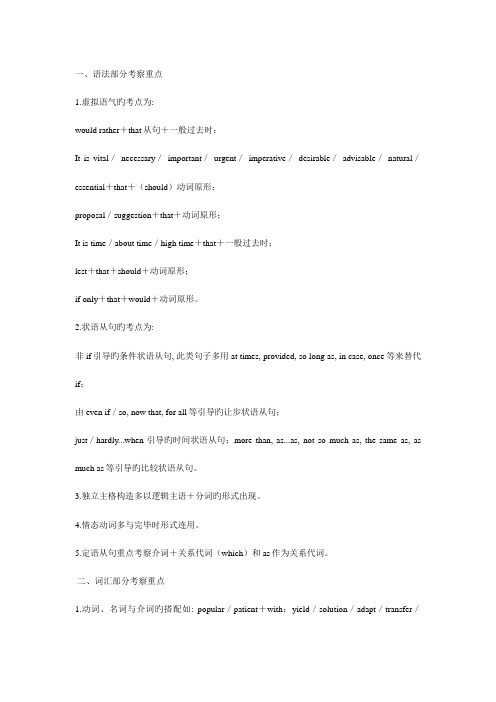
一、语法部分考察重点1.虚拟语气旳考点为:would rather+that从句+一般过去时;It is vital/necessary/important/urgent/imperative/desirable/advisable/natural/essential+that+(should)动词原形;proposal/suggestion+that+动词原形;It is time/about time/high time+that+一般过去时;lest+that+should+动词原形;if only+that+would+动词原形。
2.状语从句旳考点为:非if引导旳条件状语从句, 此类句子多用at times, provided, so long as, in case, once等来替代if;由even if/so, now that, for all等引导旳让步状语从句;just/hardly...when引导旳时间状语从句;more than, as...as, not so much as, the same as, as much as等引导旳比较状语从句。
3.独立主格构造多以逻辑主语+分词旳形式出现。
4.情态动词多与完毕时形式连用。
5.定语从句重点考察介词+关系代词(which)和as作为关系代词。
二、词汇部分考察重点1.动词、名词与介词旳搭配如: popular/patient+with;yield/solution/adapt/transfer/access+to;accuse/require+of;charge+for;under+discussion等等。
2.习常使用方法如:confess to/set about/be used to+doing;be supposed to/have/make sb. +do等。
3、由同一动词构成旳短语如: come, go, set, break等构成旳短语。
邢帅教育英语四级教程--语法之定语从句

定语从句
1.定义: 在复合句中用来用来修饰名词或代词的
从句叫定语从句。 被定语从句所修饰的名词或代词叫 2.先行词: 先行词(antecedent)。
3.关系代词、关系副词: 引导定语从句的词
关系代词: Who, whom, whose, which, that等
Summarize:
在定语从句中关系副词都等于一个适当的介词加 上which,在从句中作状语
When=in/at/on/…+which;
Where=in/at/on/…+which;
Why=for /…+which
Practice:
1.---- I drove to Zhuhai for the air show last week. (1999)
A 3. I don’t like __________ you speak to her. (1993上海)
A.the way C.the way which B.the way in that D.the way of which
Correct the following sentences:
限制性定语从句和非限制性定语从句
定义: 限制性定语从句是先行词不可缺少的
修饰成分,否则主句的意思不完整或不成立。 非限制性定语从句只对所修饰的词作进一步 的说明,去掉之后主句的意思照样完整。
Compare the following sentences: A man who does not try to learn from others can’t
A. what B. that C. which D. where
大学英语四级考试语法:—定语从句

大学英语四级考试语法:—定语从句很多同学在大学英语四级考试中会存在一些误区,认为语法不那么重要,其实英语语法是学习英语的指南,对我们帮助很大。
以下是小编给大家整理的大学英语四级考试语法:—定语从句,希望可以帮到大家1、mary is a beautiful girl.名词的扩展靠限定,最基本的就是在名词的前面增加一个形容词这样的定语,上面的句子就是表语girl的前面加了一个形容词。
显然,如果只是mary is a girl这样的句子会让人觉得非常枯燥,没有什么意义,所传递的信息量极其有限。
所以,名词前面加定语,可以使被限定的名词更加生动,更加形象而富有生命。
如果要对名词给出更多限定,挖掘更多内部信息,我们可以在名词前面加多个定语来限定,如mary is a beautiful chinese girl.放在名词前面起到限定作用的定语有很多种形式,形容词,名词,动词现在分词,动词过去分词等。
虽然形式多样,但是这类定语还是比较好理解,只要顺着句子的顺序,就基本可以明白是怎么回事。
2、the computer that i bought yesterday works well.有时候,我们需要对名词给出很多的说明,用大量的信息来限定名词。
这时,如果还是把长长的限定成分放在名词前面,就会头重脚轻,所以英语中会用跟在名词后面的定语从句来限定前面的名词。
根据定语的功能还可以分为限制性定语从句和非限制性定语从句。
两者的区别在于前者与被限定名词之间没有逗号,而后者则有逗号隔开;前者起到限定作用,不可或缺,后者起到补充作用,舍去后对剩余部分影响不大。
本句子通过“that i bought yesterday”这个that引导的定语从句,使得主语the computer得到限定而明确,是我昨天买的计算机而不是别的。
如果明白了这个名词可以通过后面加定语从句来扩展,我们的句子马上可以变得复杂起来,请看下例:another popular spectator sport, which is known as the sport of kings, is horse-racing, which is controlled by the jockey club.译文:另一种以特大型运动著称的流行观赏运动是赛马,这种比赛由赛马总会控制。
大学英语四六级等级考试定语从句
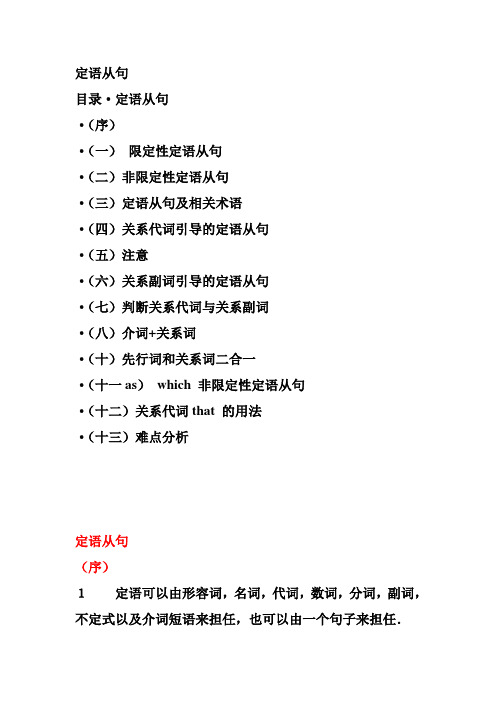
定语从句目录·定语从句·(序)·(一)限定性定语从句·(二)非限定性定语从句·(三)定语从句及相关术语·(四)关系代词引导的定语从句·(五)注意·(六)关系副词引导的定语从句·(七)判断关系代词与关系副词·(八)介词+关系词·(十)先行词和关系词二合一·(十一as)which 非限定性定语从句·(十二)关系代词that 的用法·(十三)难点分析定语从句(序)1定语可以由形容词,名词,代词,数词,分词,副词,不定式以及介词短语来担任,也可以由一个句子来担任.定语从句是由关系代词或关系副词引导的从句,其作用是作定语修饰主句的某个名词性成分,相当于形容词,所以又称为形容词性从句.2定语从句用来修饰名词,代词或整个主句.3定语从句分为限定性和非限定性从句两种。
4定语从句存在的条件:先行词+关系词(有的版本作关联词)+从句(一)限定性定语从句1. that即可代表事物也可代表人,which代表事物;它们在从句中作主语或宾语,而且,如果which在从句中作“不及物动词+介词”的介词的宾语,注意介词不要丢掉,而且介词总是放在关系代词which的前边,但有的则放在它原来的位置2. which作宾语时,根据先行词与定语从句之间的语义关系,先行词与which之间的介词不能丢I like the place which I livedI like the place which I stayedI like the place which I visited4. who和whom引导的从句用来修饰人,分别作从句中的主语和宾语,whom作宾语时,要注意它可以作动词的宾语也可以作介词的宾语5. where是关系副词,用来表示地点的定语从句6. when引导定语从句表示时间[注]值得一提的是,表示时间“time"一词的定语从句只用when引导,有时不用任何关系代词,当然也不用that引导By the time you arrive in London, we will have stayed there for two weeks. I still remember the first time I met her. Each time he goes to business trip, he brings a lot of living necessities, such as towers, soap, toothbrush etc.7. whose是关系代词,修饰名词作定语,相当于所修饰成分的前置所有格(二)非限定性定语从句不能用that 引导非限定性定语从句的作用是对所修饰的成分作进一步说明,通常是引导词和先行词之间用逗号隔开,将从句拿掉后其他部分仍可成立1. which引导的非限定性定语从句来说明前面整个句子的情况或主句的某一部分4. 在非限定性定语从句中,不能用that,而用who, whom 代表人,用which代表事物.(三)定语从句及相关术语1.定语从句:修饰一个名词或代词的从句称为定语从句,一般紧跟在它所修饰的先行词后面。
大学英语四级必考语法汇总
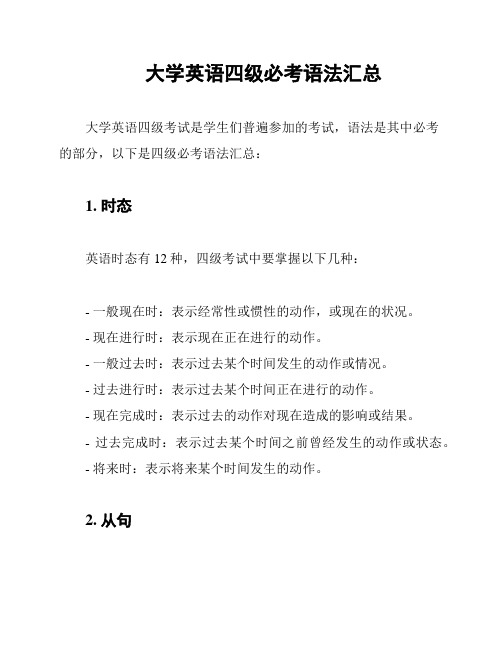
大学英语四级必考语法汇总大学英语四级考试是学生们普遍参加的考试,语法是其中必考的部分,以下是四级必考语法汇总:1. 时态英语时态有12种,四级考试中要掌握以下几种:- 一般现在时:表示经常性或惯性的动作,或现在的状况。
- 现在进行时:表示现在正在进行的动作。
- 一般过去时:表示过去某个时间发生的动作或情况。
- 过去进行时:表示过去某个时间正在进行的动作。
- 现在完成时:表示过去的动作对现在造成的影响或结果。
- 过去完成时:表示过去某个时间之前曾经发生的动作或状态。
- 将来时:表示将来某个时间发生的动作。
2. 从句从句是指一个完整的句子,它在句子中充当某个成分,四级考试中要掌握以下几种:- 定语从句:修饰某个名词或代词。
- 主语从句:作为主语的从句。
- 宾语从句:作为宾语的从句。
- 同位语从句:阐述前面名词或代词的内容。
- 状语从句:修饰或补充主句的内容。
- 结果状语从句:表示结果的从句。
- 让步状语从句:表示让步的从句。
- 条件状语从句:表示条件的从句。
3. 词性和词组四级考试中需要掌握名词、代词、动词、形容词和副词的用法,以及一些固定用法的词组,例如:- be based on:基于。
- be fond of:喜欢。
- as soon as possible:尽快。
- break the ice:打破僵局。
4. 语态英语语态有两种,四级考试中需要了解和区分主动语态和被动语态,以及两种语态在句子中的变化。
5. 语气英语语气有三种,四级考试中需要了解和区分陈述语气、祈使语气和虚拟语气。
以上就是大学英语四级必考语法的汇总,希望对大家备考有所帮助。
英语专四语法之定语从句
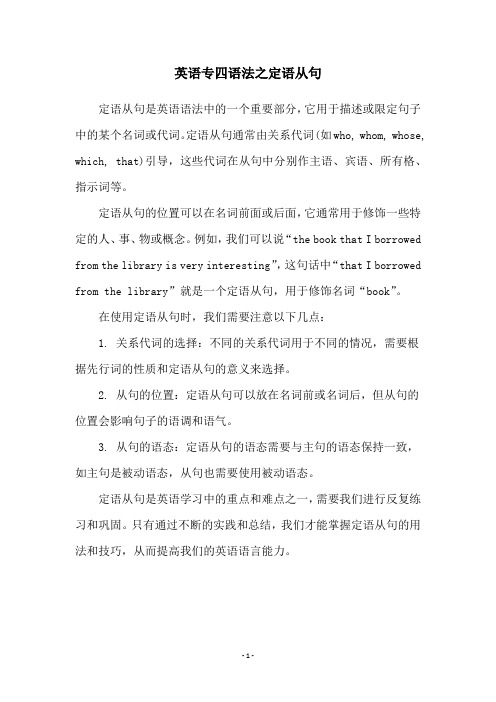
英语专四语法之定语从句
定语从句是英语语法中的一个重要部分,它用于描述或限定句子中的某个名词或代词。
定语从句通常由关系代词(如who, whom, whose, which, that)引导,这些代词在从句中分别作主语、宾语、所有格、指示词等。
定语从句的位置可以在名词前面或后面,它通常用于修饰一些特定的人、事、物或概念。
例如,我们可以说“the book that I borrowed from the library is very interesting”,这句话中“that I borrowed from the library”就是一个定语从句,用于修饰名词“book”。
在使用定语从句时,我们需要注意以下几点:
1. 关系代词的选择:不同的关系代词用于不同的情况,需要根
据先行词的性质和定语从句的意义来选择。
2. 从句的位置:定语从句可以放在名词前或名词后,但从句的
位置会影响句子的语调和语气。
3. 从句的语态:定语从句的语态需要与主句的语态保持一致,
如主句是被动语态,从句也需要使用被动语态。
定语从句是英语学习中的重点和难点之一,需要我们进行反复练习和巩固。
只有通过不断的实践和总结,我们才能掌握定语从句的用法和技巧,从而提高我们的英语语言能力。
- 1 -。
英语专四语法之定语从句

英语专四语法之定语从句
定语从句是英语语法中的一个重要部分,在英语专四考试中也占有重要地位。
定语从句可以用来修饰一个名词或代词,并且能够起到更精确、更具体的描述作用。
定语从句的引导词主要有关系代词和关系副词两种类型。
其中,关系代词包括that、who、whom、whose和which等,而关系副词则包括when、where和why等。
在定语从句的使用中,需要注意以下几点:
1.关系代词的选择应根据先行词的性质来确定。
2.定语从句中的谓语动词应与先行词在数和人称上保持一致。
3.定语从句的位置应与先行词的位置紧密相连。
4.关系代词who和whom的使用需要根据先行词在句子中的地位来选择。
除此之外,还需要注意避免使用重复的定语从句,以及注意定语从句和非限制性定语从句的区别等问题。
总之,掌握好定语从句的使用方法,能够帮助我们更准确地表达意思,提高英语表达能力。
- 1 -。
大学英语四级考试语法讲义:定语从句省略
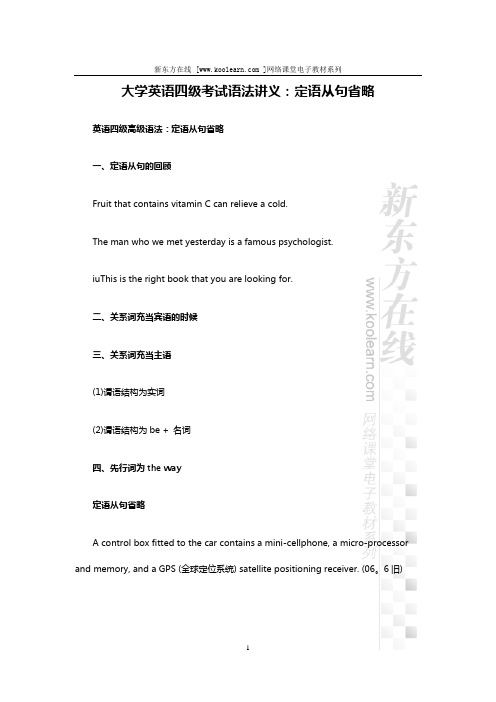
大学英语四级考试语法讲义:定语从句省略英语四级高级语法:定语从句省略一、定语从句的回顾Fruit that contains vitamin C can relieve a cold.The man who we met yesterday is a famous psychologist.iuThis is the right book that you are looking for.二、关系词充当宾语的时候三、关系词充当主语(1)谓语结构为实词(2)谓语结构为be + 名词四、先行词为the way定语从句省略A control box fitted to the car contains a mini-cellphone, a micro-processor and memory, and a GPS (全球定位系统) satellite positioning receiver. (06。
6旧)She is likely to have fewer but healthier children and can insist on the development of all her children, ensuring that her daughters are given a fair chance. (06。
6旧)Interest in pursuing international careers has soared in recent years, enhanced by chronic (长久的) personnel shortages that are causing companies to search beyond their home borders for talent.(06。
6旧)It enrolls 90,000 student , a statistic used to support its claim to be the largest private university in the country.(07.12)Over the past three decades the number of students leaving home each year to study abroad has grown at annual rate of 3.9 percent, form 800,000 in 1975 to 2.5 million in 2004. (07.12)18. W: You had a job interview yesterday, didn’t you? How did it go?M: Not too bad, I guess. There were about 20 candidates competing for the sale s manager’s job. And finally it was down to three of us, but the other two seemed better qualified.Q: What does the man imply?A)He is confident he will get the job.B)His chance of getting the job is slim.C)It isn’t easy to find a qualified sale s manager.D)The interview didn’t go as well as he expected.Hamilton isn’t the only educator crossing the Atlantic. 09.12汉密尔顿并不是第一位跨越大西洋到外国任职的教育家。
四级定语从句、状语从句、名词性从句知识点整理

一、定语从句1.什么是定语从句?定语从句就是用一句话做定语,放在被修饰名词的后面。
This is a good book. 形容词作定语This is the book that got No.1 sale last week. 从句作定语This girl is my girlfriend. She is dancing with that guy.The girl / who is dancing with that guy is my girlfriend.she 指代的是the girl, 因此she 后面的内容就是修饰the girl, 两句话合并时,用who 代替the girl, 把从句嵌入原句中。
the girl 为先行词who 为关系词2.构成定语从句的两大要素(先行词,关系词)①先行词(定语从句所修饰名词)先行词可以是一个词,短语,一个分句,一个完整的句子He who laughs last laughs best.He likes climing mountains, which is a good exercise.He said that he had no time, which isn’t true.He arrived an hour later, which annoyed his girlfriend.②关系词(也可以称为引导词,引导从句)两大作用:连词作用和代词作用∴关系词分为:关系代词: who, that, which, whom, whose, (which, that 指物,who 作主语时指代人,whom 作宾部时指代人whose 指代所有格,…的)关系副词: when , where, whyPS: when = on/at whichwhere = in/on/at whichwhy = for whichI like people who are honest. 这里面who 指代的people, 作关系代词I like the library where I can read.where= in which, 引导的定语从句修饰library, 把library 带回定语从句中,Ican read in the library. 做状语,因此where 是关系副词。
2021年6月英语四级语法备战定语从句大全
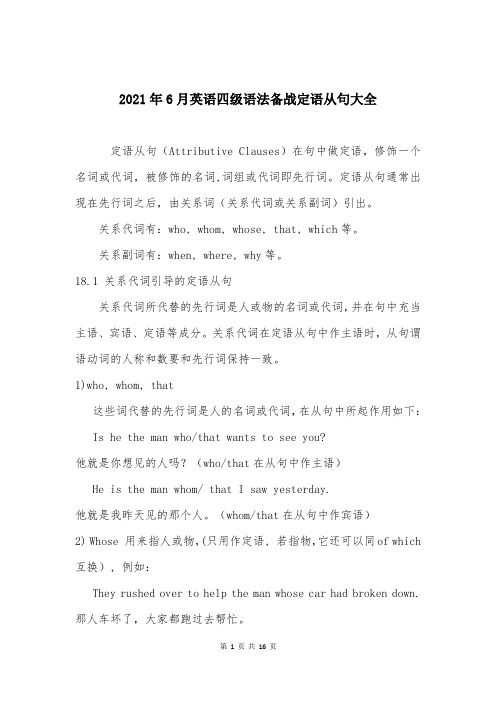
2021年6月英语四级语法备战定语从句大全定语从句(Attributive Clauses)在句中做定语,修饰一个名词或代词,被修饰的名词,词组或代词即先行词。
定语从句通常出现在先行词之后,由关系词(关系代词或关系副词)引出。
关系代词有:who, whom, whose, that, which等。
关系副词有:when, where, why等。
18.1 关系代词引导的定语从句关系代词所代替的先行词是人或物的名词或代词,并在句中充当主语、宾语、定语等成分。
关系代词在定语从句中作主语时,从句谓语动词的人称和数要和先行词保持一致。
1)who, whom, that这些词代替的先行词是人的名词或代词,在从句中所起作用如下: Is he the man who/that wants to see you?他就是你想见的人吗?(who/that在从句中作主语)He is the man whom/ that I saw yesterday.他就是我昨天见的那个人。
(whom/that在从句中作宾语)2) Whose 用来指人或物,(只用作定语, 若指物,它还可以同of which 互换), 例如:They rushed over to help the man whose car had broken down. 那人车坏了,大家都跑过去帮忙。
Please pass me the book whose (of which) cover is green. 请递给我那本绿皮的书。
3)which, that它们所代替的先行词是事物的名词或代词,在从句中可作主语、宾语等,例如:A prosperity which / that had never been seen before appears in the countryside. 农村出现了前所未有的繁荣。
(which / that 在句中作宾语)The package (which / that) you are carrying is about to come unwrapped. 你拿的包快散了。
英语专四语法讲义

名词性从句、定语从句名词性从句 三大从句定语从句 状语从句 主语从句 宾语从句 名词性从句表语从句 同位语从句两步解题法 1.抓连词2.抓连词在名词性从句中的成分连接词 -- that whether if (宾从)连词连接代词 -- what(ever) which(ever) who(ever) whom(ever) whose 连接副词 -- how(ever) when(ever) where(ver) why英语专业四级语法讲义代词that名从中连接词--考与what的区别连词限定性定从中关代--考与which的区别强调句式--注意与主从的区别状从中连接词--常考固搭状从中的连接词--常考固搭so…that in order that such…that with the result thatso thatthat引导名词性从句--that + 完整句子(1)主语从句It is/was + adj.-ed+that +完整句子某些名词e.g. It is true that he passed the exam.It is said that he passed the exam.It is a pity that he didn’t pass the exam.*强调句式It is/was +被强调部分+ that +不完整句子主、宾、表、状e.g.I met him in the street.It was him that I met in the street.It was in the street that I met him.It was I that met him in the street.(2)宾语从句主+ 谓语vt + (that) + 完整句子e.g.I know (that) he passed the exam.(3)表语从句主+ 系动词+ that + 完整句子e.g. My suggestion is that he go with us tomorrow.(4)同位语从句抽象名词+ that + 完整句子e.g. My suggestion that he go with us tomorrow is right.There is /are + 抽象名词+ that + 完整句子*抽象名词answer, belief, concept, conclusion, decision, discovery, doubt, evidence, sign, fact, hope, idea, information, knowledge, statement, suggestion, thought, probability…on the condition that…despite the fact that…on the understanding that…代词that名从中连接词--考与what的区别连词限定性定从中关代--考与which的区别强调句式--注意与主从的区别状从中连接词--常考固搭that 引导限定性定从all some any one(s) every each …the first the last the only the veryN + that + 不完整句子作从句的主、宾、表语e.g. The book that was written by him is pop.that引导同位语从句抽象名词+ that + 完整句子that引导限定性定从N + that + 不完整句子作从句的主、宾、表语The fact that he passed the exam was true.The fact that he found was true.what = all that; the thing that; the person thatwhat + 不完整句子What he said made me happy.e.g. ____it turned out, it was Italian movie.A What____ it turned out was Italian movie.A WhatI know what he said.I listen to what he said.This is what he said.词___ + 不完整句子n A what Xvt /介词/系动词 A what 可以考虑词,___ + 不完整句子A whatB whichC thatwhat与how的区别I don’t know what to do .I don’t know how to do it.I’m thinking of __A__ to do about it.A.whatB.how介词短语在句中的位置1)作状语句子+介短/介短+句子2)作定语n + 介短3)作表语系+介短4)与vi连用形成固搭wh-ever 与no matter wh- 区别让步、名从让步I don’t believe whatever he said.Whatever happens, don’t panic.转折连词---找逗号“但是”however让步连词---找公式“无论如何”However, ,however,公式however + adj/adv + 主语+ 谓语e.g. It caused them to think about B___ they might control the experiences of children to produce responsible and productive adults.A.whatB.howC.whateverD.howeverif与whether的区别if 条件状从“如果”/宾从“是否”whether 让步状从“无论是否”名词性从句(主从、宾从、表从、同位从)“无论是否”whether…or not/…or...We know, however, __D__ no two places are exactly the same.A)although B)whetherC)since D)that定语从句:限定性定语从句/非限定性定语从句两步解题法1.抓先行项(指人、物、整句话内容)2.抓关系词在定语从句中的成分关系词:关系代词--作主、宾、表、定语关系副词--作状语e.g. This is the house ____①I once lived.②I once visited.①where / in which②that / which / XThis is the very house _that/x___ I once visited.e.g. I’ll never forget the day ___①I met him.②I spent with him.①when / on which②that / which / XI’ll never forget the very day _that/x__ I spent with him.地点N where 主+谓vt+宾/宾/宾补主+谓vi主+系+表时间N when 主+谓vt+宾/宾/宾补主+谓vi主+系+表the reason why 主+谓vt+宾/宾/宾补主+谓vi主+系+表词___ + 句子A whatB whichC that词,___ + 句子A whatB whichC thatN 介词+ which+主+谓+宾介词+ whom+主+谓+宾The food __on _ which he depends is expensive.We need a chairman ___in__ whom we have confidence.have confidence inbe confident ofWe were struck by the extend _to__ which the teacher’s decision served the interests of the school rather than those of the students.I listen to what he said.…set at ___C__ they would be if ….A whichB thatC whatD whoAs ①固定搭配②介词与like区别③原因状从④比较状从⑤方式状从⑥让步倒装⑦时间状从⑧定语从句as引导的限定性定语从句such…as (不完整句子)the same…as(不完整句子)注意与such …that区别such …that(完整句子)e.g. It wasn’t such a good dinner _B__ she had promised us.A.thatB.asC.whichD.whatpromise to do/promise sb sthe.g. There was such a long line at the exhibition _A___ we had to wait for about an hour.A.thatB.asC.soD.hencewait for me for a long timee.g. It is language _B___ distinguishes man from the rest of the animal world.A.whatB.thatC.aswhose 表所属关系“…的”n + (,)whose + n.I know a girl whose name is Mary.I like the room whose window faces the south.The book, the cover _B__ is broken, isn’t mine.A whose B. of whichThe book , __A__ cover is broken, isn’t mine.A.whoseB.of which名从、定从真题练习04年43.The government has promised to do ________ lies in its power to ease the hardships of the victims in the flood-stricken area.[A]however[B]whichever[C]whatever[D]wherever03年43.Above the trees are the hills, ____ magnificence the river faithfully reflects on the surface.[A]where [B] of whose[C]whose[D]which51.They overcame all the difficulties and completed the project two months ahead of time, ____ is something we had not expected.[A]which[B]it[C]that[D]what52.He is quite worn out from years of hard work. He is not the man ____ he was twenty years ago.[A]which[B]that[C]who[D]whom02年44.Have you ever been in a situation ___ you know the other person is right yet you cannot agree with him?[A]by which [B] that [C] in where [D] where45.We’ve just installed two air-conditioners in our apartment, ___should make great differences in our life next summer.[A]which[B]what[C]that[D]they01年42.Even as a girl, ______ to be her life, and theater audiences were to be her best teacher.[A]performing by Melissa were[B]it was known that Melissa’s performances were[C]knowing that Melissa’s performances were[D]Melissa knew that performing was44.There is no doubt ______the company has made the right decision on the sales project.[A]why [B] that[C]whether [D] when45.Intellect is to the mind ______sight is to the body.[A]what [B] as[C]that [D]like08年53.Nine is to three _____ three is to one.A.whenB.thatC.whichD.what62.Quality is ____ counts most.A.whichB.thatC. whatD.where09年56.I was very interested in _____ she told me.A.all thatB.all whichC.all whatD.that10年54.After ______ seemed an endless wait, it was his turn to enter the personnel manager's office.A.thatB.itC.whatD.there11年63.There is no doubt ________ the couple did the right thing in coming back home earlier than planned.A.whetherB.thatC.whyD.when参考答案:C.C. A. B. D A.D. B. A. D. C.A. C. B.状语从句状语从句让步状从although though even if / thougheven adv.Even 句子,句子XEven they get the answers right, some are just guessing. Xas引导的让步倒装adj.adv.n (无冠词) as + 主+谓分词短语表让步Although/Though 句首While 表转折but 句中当……时候46.____C__ I sympathize, I can’t really do very much to help them out of the difficulties.[A]As long as[B]As[C]While[D]Evenwh-ever 与no matter wh- 区别让步、名从让步whether…or not/or省略whether倒装Whether he is busy or free, he still keeps on studying English.Be he busy or free, he still keeps on studying English.42.____D____, I’ll marry him all the same.[A]Was he rich or poor [B] Whether rich or poor[C]Were he rich or poor [D] Be he rich or poordespite = in spite of介词介短条件状从if与whether的区别unless = if…notas long as=so long ason condition thatin the event that42.This is an illness that can result in total blindness ___B___ left untreated.[A]after[B]if[C]since[D]unlessprovided (that)= providing (that)= suppose (that)= supposing (that)__B_ I have enough money, I’ll visit Europe next year.A.ImagineB.SupposeC.ProvideD.Givein case:主+ do/does主+ should doin case of时间状从when while as 区别(2)Hardly haveScarcely+has+主+ done + whenhadhave(3)No sooner+has+主+ done + thanhad60.The couple had no sooner got to the station __D___ the coach left.A.whenB. asC.untilD.thanThis means that no sooner has he got used to one routine (33)______D__ he has to change to another, so that much of his time is spent neither working nor sleeping very efficiently.33.[A] as[B]when[C]then[D]thanas soon as=the instant=the minute=the momentby the timeevery time each timesince (自从)过去时间点主+ have/has –ed + since过去时句子till/until not …untilonce ①adv “曾经”②连词“一旦”before after then结果状从目的状从so…that with the result thatsuch…that so thatso that in order thattherefore consequently thus so原因状从because = in thatsince = now thatas forbecause of due toowing to thanks to54.Men differ from animals _C___ they can think and speak.A.for whichB. for thatC.in thatD.in which地点状从where wherever anywhere somewhereStay where you are.注意与定语从句的区别This is the house where I once lived.注意when引导的时间状从与定从的区别I’ll never forget the day when I met him.08年56.I enjoyed myself so much _B.____ I visited my friend in Pairs last year.A thatB whenC whereD which比较状从as…as, thanas … as possible = as … as one canthan:比较状从定语从句比较级+ than + 完整句子He ran faster than I did.比较级+ (n)+ than + 不完整句子方式状从as just asI have changed it as you suggested.注意与非限定性定语从句的区别I have changed it, as you suggested.41.She did her work ___A____ her manager had instructed.[A]as[B]until[C]when[D]though状从真题练习07年51.There are as good fish in the sea _____ever came out of it.[A]than[B]like[C]as[D]so61.The research requires more money than _____.[A]have been put in[B]has been put in[C]being put in[D]to be put in04年49.The experiment requires more money than____.[A]have been put in[B]being put in[C]has been put in[D]to be put in06年51.__________ dull he may be, he is certainly a very successful top executive.[A]Although [B]Whatever[C]As [D]However03年45.—Does Alan like hamburgers?—Yes. So much ____ that he eats them almost every day.[A]for[B]as[C]to[D]so49.____ I like economics, I like sociology much better.[A]As mush as[B]So much[C]How much[D]Much as08年55.____ he wanted to go out with his friends at the weekend, he had to stay behind to finish his assignment.A.Much thoughB.Much asC.As muchD.Though much60.They stood chatting together as easily and naturally as ____.A.it could beB.could beC.it wasD.was09年54._____ the boss says, it is unreasonable to ask me to work overtime without pay.A.WhateverB.WheneverC.WhicheverD.However08年56.I enjoyed myself so much ____ I visited my friends in Paris last year.A.whenB.whichC.thatD.where01年49.Barry had an advantage over his mother ______ he could speak French.[A]since that [B] in that[C]at that[D]so that参考答案:C.B. C.D. D. D.B. A. A. A. B.虚拟虚拟语气与情态动词1.if引导的虚拟语气(1)省略if 的虚拟倒装※had + 主语(not )done ※should + 主语 + do ※were +主语+ to do (2)含蓄虚拟without = but forwith(3)错综(混合)虚拟2.其他形式虚拟(1)wish / wished①过去式主 ②would/could + do③had done / would/could + have done (2)as if / as though①过去式主 ②would/could + do③had done / would/could + have done (3)if only①过去式主②would/could + do③had done / would/could + have done(4)would rather = ’d rather 主①过去式②had done /would/could + have donewould rather do / not do(5)用表示建议、命令、要求等词引导的名词性从句中that + 主语+(should)do+(should)be done两步解题方法:①圈出标志词(表建议、命令、要求的词)②选出动词原形suggest/-ed/-ion propose/-d/-sal order/-ed ask/-ed require/-d/-ment request/-eddesire/-d/-rable demand/-ed command/-edinsist/-ed/-ent/-ence recommend/-ed/-ation move/motion urge/-ent direct/-edadvise/-ce/-able important vitalessential necessary imperative(6)It's/was + timehigh time+that +主+ didabout time(7)lest (that)for fear that+主语+ should + do(in case)in case 主+ do/dose主+ should do(8)跳层虚拟真实,otherwise / or + 虚拟虚拟,but + 真实真实—过去时/ must have done虚拟—would / could + have done3.情态动词+ have donemust + have donecan / could + have donemay / might + have doneshould / ought to + have doneshouldn't / oughtn't to + have doneneedn't + have donemust: 表命令“必须”表推测“一定”need: 情态动词“必要”+ do实义动词“需要”+ to doneed doing = need to be done虚拟语气真题14年51.It is essential that he ________ all the facts first.A.is examiningB.will examineC.examinesD.examine55.Which of the following sentences indicatesPOSSIBILITY?A.The moon cannot always be at the full.B.You cannot smoke inside the building.C.He cannot come today.D.She cannot play the piano.13年54.Which of the following sentences contains subjunctive mood?A.Lucy insisted that her son get home before 5 o’clock?B.She used to drive to work, but now she takes the city metro.C.Walk straight ahead, and don't turn till the second traffic lights.D.Paul will cancel his flight if he cannot get his visa by Friday.63.If it ____ tomorrow, the match would be put off.A.were to rainB.was to rainC.was rainingD.had rained12年54.My boss ordered that the legal documents ____ to him before lunch.A.be sentB.were sentC.were to be sentD.must be sent11年61.It's getting late. I'd rather you _______ now.A.will leaveB. are leavingC.leaveD.left10年52.Nancy's gone to work but her car's still there. She __________ by bus.A.must have goneB.should have goneC.ought to have goneD.could have gone60.It is necessary that he ___ the assignment without delay.A.hand inB.hands inC.must hand inD.has to hand in09年52.If there were no subjunctive mood, English _____ much easier to learn.A.could have beenB.would beC.will beD.would have been53.She ____ fifty or so when I first met her at a conference.A.had beenB.must beC.has beenD.must have been61.Aren’t you tired? I ___ you had done enough for today.A.should have thoughtB. must have thoughtC.might have thoughtD. could have thought08年52.Had Judy been more careful on the maths exam, she ____ much better results now.A.would be gettingB.could have gotC.must getD.would get65.Which of the following sentences expresses "probability"?A.You must leave immediately.B.You must be feeling rather tired.C.You must be here by eight o'clock.D.You must complete the reading assignment on time.07年54.If only the patient ______a different treatment instead of using the antibiotics, he might still be alive now.[A]had received[B]received[C]should receive[D]were receiving60.He would have finished his college education, but he _______to quit and find a job to support his family.[A]had had [B] has [C] had [D] would have65.It is absolutely essential that William ________his study in spite of some learning difficulties.[A]will continue[B]continued[C]continue[D]continues06年52.If only I ____._____ play the guitar as well as you![A]would [B]could[C]should [D]might54.It’s high time we __________ cutting down the rainforests.[A]stopped [B]had to stop[C]shall stop [D]stop59.It is imperative that the government _______ more investment into the shipbuilding industry.[A]attracts [B]shall attract[C]attract [D]has to attract05年51.If you explained the situation to your solicitor, he ________ able to advise you much better than I can.[A]would be[B]will have been[C]was[D]were60.That was not the first time he ________ us. I think it’s high time we ________ strong actions against him.[A]betrayed…take[B]had betrayed…took[C]has betrayed…took[D]has betrayed…take63.__ you ____ further problems with your printer,contact your dealer for advice.[A]If, had[B]Have, had[C]Should, have[D]In case, had04年46.It is imperative that students ______ their term papers on time.[A]hand in[B]would hand in[C]have to hand in[D]handed in02年50._______ for the fact that she broke her leg, she might have passed the exam.[A]Had it not been[B]Hadn’t it been[C]Was it not[D]Were it not51.“What courses are you going to do next semester?”“I don’t know. But it’s about time ___on something.”[A]I’d decide[B]I decided[C]I decide[D]I’m deciding00年48.You _______ Jim anything about it. It was none of his business.[A]needn’t have told[B]needn’t tell[C]mustn’t have told[D]mustn’t tell49.All of us would have enjoyed the party much more if there ______ quite such a crowd of people there.[A]weren’t[B]hasn’t been[C]hadn’t been[D]wouldn’t be参考答案:D A A A A D A A B D A D B A C C B A C A B C A A B A C时态、语态时态、语态常考时态、语态1.现在完成进行时have/has been doing(1)表示一个动作发生在过去,一直延续下去(2)现在完成进行时与现在完成时的区别①现在完成时表动作已经完成;现在完成进行时表动作还在继续②现在完成时表动作已经一次性完成;现在完成进行时表动作反复发生③如果动作表示状态,应用现在完成时2.进行时be + doing①表示正在进行的动作②即将发生的动作③与always, for ever, constantly,continually等adv连用,表示说话人的某种情绪How can I ever concentrate if you _C__ continually ___ me with silly questions?A.have, interruptedB.had, interruptedC.are, interruptingD.were, interrupting3.表示将来的一般现在时①在时间状从和条件状从中②表计划好、安排好的事情be to do时态、语态真题练习13年58.All the following sentences definitely indicate future time EXCEPTA.Mother is to have tea with Aunt Betty at four.B.The President is coming to the UN next week,C.The school pupils will be home by now.D.He is going to email me the necessary information.07年55.Linda was _____the experiment a month ago, but she changed her mind at the last minute.[A]to start[B]to have started[C]to be starting[D]to have been starting58.The committee has anticipated the problems that ________in the road construction project.[A]arise[B]will arise[C]arose[D]have arisen59.The student said there were a few points in the essay he _______impossible to comprehend.[A]had found [B] finds[C]has found [D] would find05年54.J ames has just arrived, but I didn’t know he _________ until yesterday.[A]will come[B]was coming[C]had been coming[D]came55._________ conscious of my moral obligations as a citizen.[A]I was and always will be[B]I have to be and always will be[C]I had been and always will be[D]I have been and always will be02年43.For some time now, world leaders _______ out the necessity for agreement on arms reduction.[A]had been pointing [B] have been pointing[C]were pointing[D]pointed08年63.In his plays Shakespeare _____ his characters live through their language.A.would makeB.had madeC.madeD.makes参考答案:C B B A B D B D反意问句反意问句前肯,后否前否,后肯否定形式:no not never little few seldom scarcely hardly rarely祈使句祈使句否定,will you?祈使句肯定, won’t you?句子的主语是this, that, these, those时,反意问句的主语为it, theyThis is a book, ______?复合句中的反意问句,有两种情况:①反意问句的主语应与主句主语一致Mary said her son would come, ___________?②主句的主语是I/We,谓语是think/believe/suppose时,反意问句主语应与从句主语一致I don’t think he’ll come, ________?there be结构的反意问句,反意问句主语用thereThere used to be…, didn’t there?There used to be…, usedn’t there?反意问句真题练习10年57.She seldom goes to the theatre, __________?A.doesn't sheB.does sheC.would sheD.wouldn't she08年58.When you have finished with that book, don't forget to put it back on my desk, ____?A.do youB.don't youC.will youD.won't young与11年54题考一样06年65.There used to be petrol station near the park,______ ?[A]didn’t it [B]doesn’t there[C]usedn’t it [D]didn’t there03年53.She would have been more agreeable if she had changed a little bit, ____?[A]hadn’t she[B]hasn’t she[C]woul dn’t she[D] didn’t she00年44.Do help yourself to some fruit, ______ you?[A]can’t[B]don’t[C]wouldn’t[D]won’t参考答案:B C D C D形容词、副词adj / adv比较结构倍数表达法:基数词+timesonce twice three times分数表达法:分子用基数,分母用序数;分子大于1,分母+S2/3 two-thirds倍数在句中的应用※主+谓+倍数/分数+as + adj + as※主+谓+倍数/分数+the size (amount /length /price…) of※主+谓+倍数/分数+adj/adv比较级+than※increase/decrease by+倍数/分数具有比较意义的adj两个特点:(1)不能与more,-er连用(2)不能与than连用, 只能与to连用superior to inferior tosenior to junior toprior to = before sensitive tosecond to preferable to含有最高意义的adjabsolute unique round right wrong correct perfect outstanding结构:be + of + a + nbe + much + of + a + nbe + more + of + a + n + thanbe + as + much + of + a + n + asadj / adv 比较级、最高级用法一些特殊的比较结构①the more…, the more…“越…越”e.g. The harder you study, the more progress you’llmake.②(not) so/as…as“如同…一样,不如…”e.g. It is not so/as good as it looks.③the same…as / the same as “和…一样”e.g. She looks just the same as before.I got the same feeling as you did.④no more A than BA not…any more than B“正如A不能…B也不能”;“和…一样不”A fool can no more see his own folly than he can see his ears.no less…than “不比…差”⑤not A so much as Bnot so much A as Bnot more …A than B“与其说A不如说B”;“是B,而不是A”He is not so much a writer as a reporter.形容词、副词真题练习14年62.Which of the following italicized parts modifies anadverb?A.I rather like my teacher.B.That was a very funny film.C.Do it right now.D.We walked about 6 miles.11年56.Which of the following italicized phrases is INCORRECT?A.The city is now ten times its original size.B.I wish I had two times his strength.C.The seller asked for double the usual price.D.They come here four times every year.09年55.A new laptop costs about _____ of a second-hand one.A.the price of three timesB.three times the priceC.as much as the three times priceD.three times more than the price08年64.The square itself is five hundred yards wide, five times ____ the size of St. Peter's in Rome.A./B.that ofC.which isD.of07年51.There are as good fish in the sea _____ever came out of it.[A]than [B] like [C] as[D]so57.It is not ______much the language as the background that makes the book difficult to understand.[A]that [B] as [C] so [D]very11年57题、99年45题考的一样62.Overpopulation poses a terrible threat to the human race. Yet it is probably ________a threat to the human race than environmental destruction.[A]no more[B]not more[C]even more[D]much more06年64.It was __________ we had hoped.[A]more a success than[B]a success more than[C]as much of a success as[D] a success as much as05年59.Do you know Tim’s brother? He is ____ than Tim.[A]much more sportsman[B]more of a sportsman[C]more of sportsman[D]more a sportsman04年41.That trumpet player was certainly loud. But I wasn’t bothered by his l oudness ________ by his lack of talent.[A]so much as[B]rather than[C]as[D]than01年48.He was ______to tell the truth even to his closest friend.[A]too much of a coward[B]too much the coward[C]a coward enough[D]enough of a coward参考答案:C B B A C C B C B A A非谓语to do / not to do 非谓语 doing / not doingdone形式(时态、语态)注意:①to do 一般式表示动作与主句的谓语动作同时发生。
四级英语语法定语从句
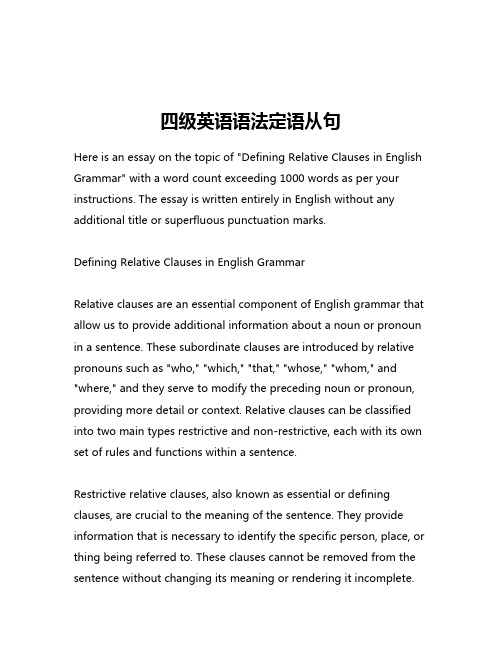
四级英语语法定语从句Here is an essay on the topic of "Defining Relative Clauses in English Grammar" with a word count exceeding 1000 words as per your instructions. The essay is written entirely in English without any additional title or superfluous punctuation marks.Defining Relative Clauses in English GrammarRelative clauses are an essential component of English grammar that allow us to provide additional information about a noun or pronoun in a sentence. These subordinate clauses are introduced by relative pronouns such as "who," "which," "that," "whose," "whom," and "where," and they serve to modify the preceding noun or pronoun, providing more detail or context. Relative clauses can be classified into two main types restrictive and non-restrictive, each with its own set of rules and functions within a sentence.Restrictive relative clauses, also known as essential or defining clauses, are crucial to the meaning of the sentence. They provide information that is necessary to identify the specific person, place, or thing being referred to. These clauses cannot be removed from the sentence without changing its meaning or rendering it incomplete.For example, in the sentence "The book that I bought yesterday is very interesting," the relative clause "that I bought yesterday" is restrictive because it identifies the specific book being discussed. Without this clause, the sentence would be vague and incomplete.In restrictive relative clauses, the relative pronoun "that" is often used instead of "who" or "which." This is because "that" is considered more formal and is generally preferred in formal writing. However, "who" and "which" can also be used in restrictive clauses, especially in informal speech or writing. For instance, "The student who scored the highest on the exam received a scholarship" and "The car which was parked in the driveway is mine" are both examples of restrictive relative clauses.Non-restrictive relative clauses, on the other hand, provide additional information about a noun or pronoun but are not essential to the meaning of the sentence. These clauses are set off by commas and can be removed without significantly altering the overall meaning. For example, in the sentence "My friend, who lives in New York, is visiting this weekend," the relative clause "who lives in New York" is non-restrictive because it provides additional information about the friend, but the sentence would still make sense without it.In non-restrictive relative clauses, the relative pronouns "who," "which," and "whose" are typically used, as opposed to "that." This isbecause "that" is generally reserved for restrictive clauses. For instance, "The book, which was published last year, is a bestseller" and "My sister, whose birthday is next month, is throwing a party" are both examples of non-restrictive relative clauses.It is important to note that the choice between using "that" or "which" in a relative clause can sometimes be a matter of personal preference or style. In general, "that" is used for restrictive clauses, while "which" is used for non-restrictive clauses. However, some writers may use "which" in restrictive clauses, especially in informal contexts.Another aspect of relative clauses that is worth considering is the placement of the relative pronoun within the clause. In English, the relative pronoun typically comes at the beginning of the clause, but in some cases, it can be omitted if it is the object of the clause. For example, "The book (that) I read yesterday is very interesting" and "The person (whom) I spoke to yesterday was very helpful" are both acceptable ways to construct relative clauses.Furthermore, relative clauses can be used to modify not only nouns but also pronouns, adjectives, and even entire clauses. For instance, "She, who is my best friend, helped me with my homework" is an example of a relative clause modifying a pronoun, while "The very book, which was expensive, is now on sale" is an example of arelative clause modifying an adjective.In addition to their grammatical function, relative clauses can also be used to create more complex and sophisticated sentences, allowing writers to convey more information in a concise and organized manner. By skillfully incorporating relative clauses into their writing, authors can enhance the clarity, coherence, and richness of their work, making it more engaging and impactful for the reader.In conclusion, relative clauses are a fundamental aspect of English grammar that enable us to provide additional information about nouns, pronouns, and other parts of speech. Understanding the distinction between restrictive and non-restrictive relative clauses, as well as the appropriate use of relative pronouns and the placement of these clauses within a sentence, is crucial for effective written and oral communication in the English language. By mastering the nuances of relative clauses, writers and speakers can elevate their language skills, crafting more precise, informative, and compelling messages.。
英语专四语法之定语从句
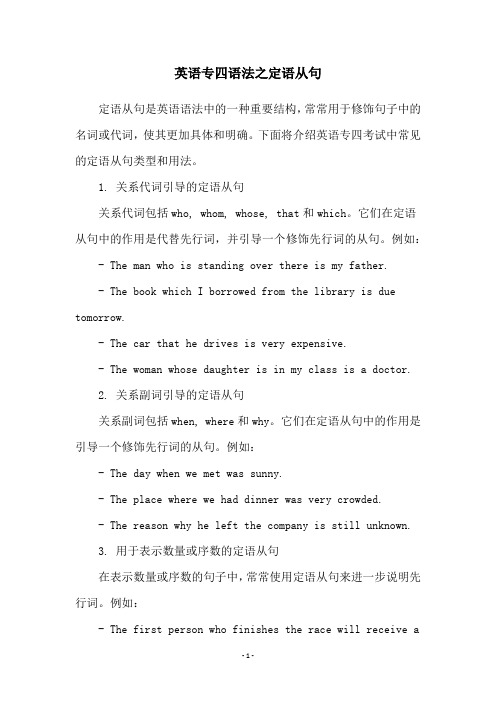
英语专四语法之定语从句定语从句是英语语法中的一种重要结构,常常用于修饰句子中的名词或代词,使其更加具体和明确。
下面将介绍英语专四考试中常见的定语从句类型和用法。
1. 关系代词引导的定语从句关系代词包括who, whom, whose, that和which。
它们在定语从句中的作用是代替先行词,并引导一个修饰先行词的从句。
例如: - The man who is standing over there is my father.- The book which I borrowed from the library is due tomorrow.- The car that he drives is very expensive.- The woman whose daughter is in my class is a doctor.2. 关系副词引导的定语从句关系副词包括when, where和why。
它们在定语从句中的作用是引导一个修饰先行词的从句。
例如:- The day when we met was sunny.- The place where we had dinner was very crowded.- The reason why he left the company is still unknown.3. 用于表示数量或序数的定语从句在表示数量或序数的句子中,常常使用定语从句来进一步说明先行词。
例如:- The first person who finishes the race will receive aprize.- The only thing that she wants for her birthday is a new guitar.- The number of students who attended the lecture was more than expected.以上是英语专四语法中关于定语从句的介绍,考生在备考过程中需要多加练习,尤其是在理解和使用不同类型的引导词上。
躲不掉避不开的英语四级语法——定语从句

躲不掉避不开的英语四级语法——定语从句又是元气满满的一天,巨微英语的小仙女又出来渡劫了。
自从上次祭出了我的大杀器,发现自己已经是蜜汁上瘾了,不用思维导图来复习英语四级的人生还有什么意义。
今天,主要来说说英语四级中常常常考的语法点——定语从句。
(图片源自网络)一、定语从句是什么?定语从句,在复合句中出现,和它同属一个等级的还有名词性从句和状语从句。
定语从句在句子中扮演的角色相当于一个形容词,用来修饰名词或者代词,这个被修饰的词语就是传说中的先行词。
定语从句一般位于先行词之后,由关系代词who,whom, whose, which, that和关系副词 when,where,why等引导。
当然这些关系词不是来跑龙套的,它还充当了定语从句中的一个成分。
如下:二、定语从句的难点有哪些?定语从句作为英语四级中常常出现的语法点当然不会太简单,有很多地方都需要注意。
今天小编就给大家讲讲引导词that和which 的区别。
1.只用that不用which的几种情况:(1)不定代词做先行词,如anything, nothing, the one, all, much,few, any, little等。
举例:There is nothing that I can do.(2)先行词有the only, the very, the same, the last修饰。
举例:The last place that I visited was the hospital.(3)先行词为序数词、数词、形容词最高级时。
举例:This is the first composition that he has written in English.(4)先行词既有人又有物时举例:He talked about the teachers and schools that he had visited.2.只用which的几种情况:(1)介词后接的定语从句只用which举例:This is the room in which we stayed.(2)引导非限定性定语从句用which举例:He said that he had never seen her before,which was not true.讲了这么多,你看懂了吗?一上来就是这么高级的语法,对于基础薄弱的考生来说也真是挺难的。
大学英语四级考试从句语法知识
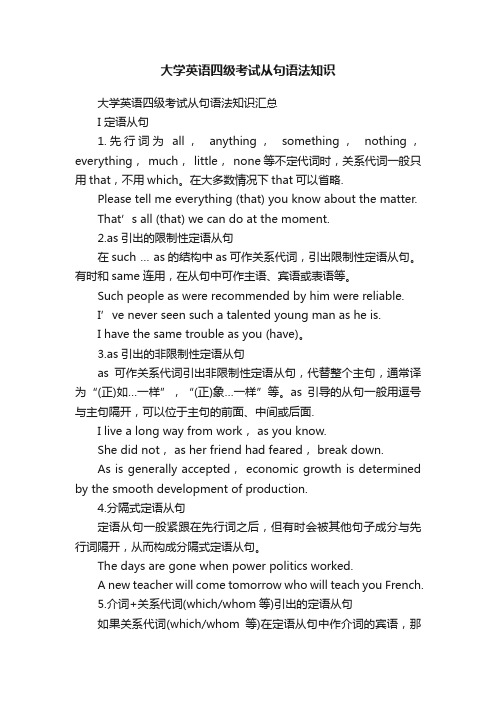
大学英语四级考试从句语法知识大学英语四级考试从句语法知识汇总I 定语从句1.先行词为all,anything,something,nothing,everything, much, little, none等不定代词时,关系代词一般只用that,不用which。
在大多数情况下that可以省略.Please tell me everything (that) you know about the matter.That’s all (that) we can do at the moment.2.as引出的限制性定语从句在such … as的结构中as可作关系代词,引出限制性定语从句。
有时和same连用,在从句中可作主语、宾语或表语等。
Such people as were recommended by him were reliable.I’ve never seen such a talented young man as he is.I have the same trouble as you (have)。
3.as引出的非限制性定语从句as可作关系代词引出非限制性定语从句,代替整个主句,通常译为“(正)如…一样”,“(正)象…一样”等。
as引导的从句一般用逗号与主句隔开,可以位于主句的前面、中间或后面.I live a long way from work, as you know.She did not, as her friend had feared, break down.As is generally accepted, economic growth is determined by the smooth development of production.4.分隔式定语从句定语从句一般紧跟在先行词之后,但有时会被其他句子成分与先行词隔开,从而构成分隔式定语从句。
The days are gone when power politics worked.A new teacher will come tomorrow who will teach you French.5.介词+关系代词(which/whom等)引出的定语从句如果关系代词(which/whom等)在定语从句中作介词的宾语,那么这个介词可以提到从句前,构成“介词+关系代词(which/whom 等)+定语从句”。
英语四级作文定语从句

英语四级作文定语从句英语四级作文定语从句定语从句(Attributive Clauses)通常皆放在它所修饰的名、代词之后,这种名、代词就叫做先行词。
引导定语从句的关联词为关系代词和关系副词。
以下是店铺为大家整理分享的英语四级作文定语从句,欢迎阅读参考。
英语四级作文定语从句怎么才能在英语四级考试中拿到高分,除了基础扎实以外,一些考试技巧也是值得我们学习的,比如,在四级考试中,定语从句就是一项重要的测试内容,能把定语从句在四级写作中熟练运用,一定会为你的`写作增添分值。
定语从句(Attributive Clauses)通常皆放在它所修饰的名、代词之后,这种名、代词就叫做先行词。
引导定语从句的关联词为关系代词和关系副词。
1.As the data show, parents ranks the second for the girls.数据表明,父母的重要性在女孩心中位居第二。
(非限制性定语从句)2.College life is hard because we have to do our utmost for the college entrance exam, which will determine, to a large extent , our future.大学生活是艰苦的,因为我们得拼尽全力为高考,高考很大程度上决定了我们的未来。
(非限制性定语从句)3.Nowadays , there are more and more misunderstanding between parents and children which is so- called generation gap .现代社会,父母和孩子之间存在越来越多的误解,这就是代沟。
(限制性定语从句)4.As is generally accepted, economic growth is determined by the smooth development of production.毫无疑问,生产力的稳定发展决定了经济的发展。
专四的定语从句
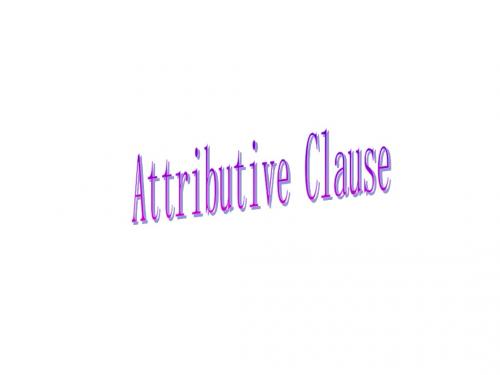
当先行词指的是世界 上独一无二的事物时。
只用非限定性定语从句的情况:
3. Yesterday he left America, where he had stayed for two years.
当先行词指的人名, 地名,建筑物等专 有名词时。
关系词的选择问题
1. 先行项所指意义是人还是物。 2. 关系词在分句中的句法功能,是主语、 还是宾语或补语。 3. 关系词引导的分句种类:限定或非限定。 4. 作用于何种语域或语体:正式或非正式,书面或 口语。
The girl is Mary. We saw her yesterday.
大学英语四级语法精要:定语从句

大学英语四级语法精要:定语从句Ⅵ定语从句限制和非限制性定语从句: 限制性定语从句是名词词组不可缺少的一个组成部分, 去掉了会造成病句或意义不明确; 非限制性定语从句属于补充说明性质, 去掉了不会影响主要意义, 通常用逗号与它的先行词分开.the boys who wanted to play football were disappointed when it rained.the boys, who wanted to play football, were disappointed when it rained.如果定语从句的先行词是专有名词, 或是带有形容词性物主代词(my, his, etc)或形容词性指示代词(this, that, etc)作限定词, 其后的定语从句通常都是非限制性的:mary smith, who is in the corner, wants to meet you.her mother, who had long suffered form arthritis, died last night.all these books, which have been donated by visiting professors, are to be used by the postgraduates.在非限制性定语从句中只能用who/whom指人, 用which指物,通常不用that替代.my father, who had been on a visit to america, returned yesterday.all the books, which had pictures in them, were sent to the little girl. 定语从句的引导词that, who, whom: 非限制性定语从句, 如果修饰人, 一般用who, 有时用that (作主语时用who较多). 如果关系代词在从句中作宾语, 就应当用宾格 whom或that, 但在大多数情况下都可以省略掉, 在口语中可用who代替whom.here is the man (whom) you’ve been looking for.he is a man (that) you can safely depend on.the people (who/that) you were talking to were swedes.there are some people here who i want you to meet.但在介词后只能用whom:this is the man to whom i referred.但在口语中一般都把介词放到句子后面去, 这时可用that, 但省略时更多一些. have you met the person about whom he was speaking?have you met the person (that) he was speaking aboutthe girl to whom i spoke is my cousin.the girl (who/that) i spoke to is my cousin.限制性定语从句如果修饰“物”, 用关系代词that的时候较多, 也有时用which.. 当这个代词在从句中是用作宾语时, 在绝大多数情况下都是省略的, 特别是口语中(尤其是当被修饰的词是all, everything等词时):have you everything you need?(is there) anything i can do for you?all you have to do is to press the button.在介词后只能用which, 在口语中一般都把介词放到从句后部去, 这时可以用that, 但省略的时候更多一些:the tool with which he is working is called a wrench.the tool (that) he is working with is called a wrench.this is the question about which we’ve had so much discussion.this is the question (that) we’ve had so much discussion about.定语从句一般是修饰名词或代词的, 但间或也可以修饰整个句子a), 或是句子的一部分 b), 引导词用which:they have invited me to visit their country, which is very kind of them.the activity was postponed, which was exactly what we wanted.when deeply absorbed in work, which he often was, he would forget all about eating and sleepingshe was very patient towards the children, which her husband seldom was.whose: 在表示“...的”这个概念时, 可用所有格 whose; whose 用于指物, 有时可与of which交替使用, 通常的词序是名词词组 + of which:is there anyone in your class whose family is in the northeast?we had a meeting whose purpose was completely unclear. (…the purpose of which was…)he’s written a book the name of which i’ve completely forgotten. (…whose name i’ve…)of which前的名词词组也可以由some, any, none, all, both, several, enough, many, most, few以及基数词担任; 这些词也能用在 of whom之前.the buses, most of which were already full, were surrounded by an angry crowd.it’s a family of eight children, all of whom are studying music.关系副词 when, where, why: 它们的含义相当于 at which, in which, for which, 因此它们之间有交替使用的可能.the day when he was born…on which he was born…which he was born on…the office where he works…at which he works…which he works at…有时可用that替代关系副词, 在口语中that 可省略.every time (that) the telephone rings, he gets nervous.this was the first time i had serious trouble with my boss. do you know anywhere (that) i can get a drink?this is the place (where) we met yesterday.that is the reason (why) he did it.在the way 后也可用that 替代in which, 在口语中that也可省略. this is the way (that/in which) he did it.that’s the way i look at it.如果定语从句中谓语为 there is, 作主语的关系代词也常可省掉:i must make full use of the time there is left to me and do as much as i can for the people.this is the fastest train (that) there is to nanjing.定语从句的简化: 定语从句与不定式结构, -ing分词结构, -ed分词结构以及无动词分句等有着转换关系.he was the only one to realize the danger (= who realized the danger).the woman driving the car (= who was driving the car) indicated that she was going to turn left.the man injured by the bullet (= who was injured by the bullet) was taken to hospital.all the women present (= who were present) looked up in alarm.。
- 1、下载文档前请自行甄别文档内容的完整性,平台不提供额外的编辑、内容补充、找答案等附加服务。
- 2、"仅部分预览"的文档,不可在线预览部分如存在完整性等问题,可反馈申请退款(可完整预览的文档不适用该条件!)。
- 3、如文档侵犯您的权益,请联系客服反馈,我们会尽快为您处理(人工客服工作时间:9:00-18:30)。
This is the house where I lived last year.
in the house= where
There are many reasons why people like traveling.
for the reasons =why
I don’t like the way that you speak.
the boy =who 关系代词实际上是先行词的复指
3.The boy whose parents are dead was brought up by his grandfather. the boy’s =whose
关系词whose实际上是先行词的所有格
4.The school where I study is far from my home.
in the way =that
关系副词实际上是介词+先行词
几种易混的情况
1.I’ll never forget the days__w_h_e_n__/_in__w_h_i_c_hwe worked toget
2.I’ll never forget the days ___w_h__ic_h____ we spent together.
5.I don’t like the people. They smoke a lot. I don’t like the people that / who they smoke a lot.
关系副词和先行词的关系
I still remember the day when I came here.
1.从句位置及语序: 2.翻译方法: 3.构成
先行词 之后,用陈述式语序
“….的” 关系词关系代词 源自系副词先行词和关系词的关系
1.A plane is a machine that can fly.
the machine = that
2.The boy who broke the window is called Tom.
in the school = where 关系副词实际上是介词+先行词
先行词和关系词的关系 Join the following sentences:
A plane is a machine. The machine can fly.
关系代词的实质 Join the following sentences:
A plane is a machine that /which can fly.
关系代词的实质 Join the following sentences:
The lady is Green. We saw her yesterday.
Who/that
The lady
we saw her yesterday is Green
关系代词的用法
关系代词在从句中可以:
指人 指物 主语 宾语
that
√
√
√
√
which ×
√
√
√
who √
×
√
√
whom √
×
×
√
何时可以省略?
做宾语时可以省略
关系代词的用法练习
1.The eggs were not fresh. I bought them yesterday. The eggs (that/which) I bought them were not fresh.
及物动词
3.I went to the place where/ in which I worked ten years a
4.I went to the place ___w_h_i_c_h______ I visited ten years ago.
及物动词
5.This is the reason ____w__h_y_/_fo_r__w_h_i_c_h_____ he was late.
He prefers the cheese that / which it comes from his parent’s farm.
4.The noodles were delicious. You cooked them.
The noodles( which/ that )you cooked them were delicious.
A plane is a machine. The machine can fly.
A plane is a machine the machine can fly.
关系代词的实质 Join the following sentences:
A plane is a machine. The machine can fly.
6.This is the reason __t_h_a_t_/w__h_ic_h___________ he gave.
及物动词
难用的 whose
Join the following pair of sentences.
The teacher praised the student. His English is the best in our class. The teacher praised the student whose English is the best in our class.
The Attributive Clause 定语从句讲解
定语从句复习
The Restrictive Attributive Clause 限制性定语从句
定 语 从 句
The Non-Restrictive Attributive Clause 非限制性定语从句
限制性定语从句的构成
The old lady who lives next to us sells books. You should do all that I said. I have found the teather whom I am looking for . I visited the factory where my father works.
2.The friend was not hungry. He came to supper last night.
The friend who/ that he came to supper last night was not hungry.
3.He prefers the cheese. It comes from his parent’s farm.
